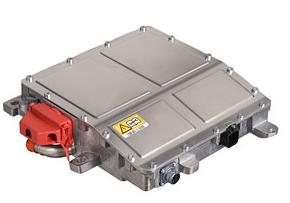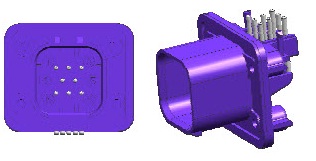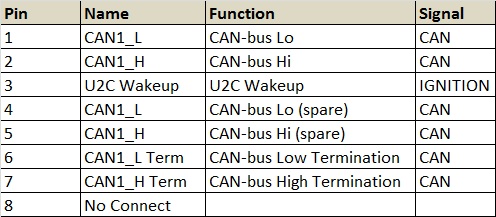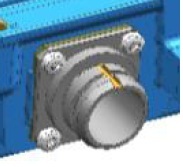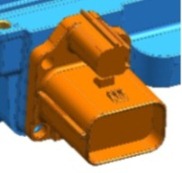Delphi
Delphi DC-DC Converter
Delphi Universal 2.2kW DC/DC Converter creates DC voltages in hybrid and electric vehicles necessary to power accessories and the HVAC system. Liquid-cooled, the DC-DC converter operates at input voltages from 216 to 422VDC with a power range to 2.2kW.
Benefits
- In production
- Proven automotive design, reliable even in the harsh environment of the engine compartment
- Highly efficient conversion using synchronous rectification
- Applicable to multiple vehicle platforms without re-engineering
Features
- Analog output voltage is adjustable through CAN serial communication; 11V – 15.5V
- Bi-directional capability supports charging of high-voltage battery
- Over-voltage, over-current, and over-temperature protection with fault reporting
- CAN serial interface
Mounting Information (Vibration Dampening)
There are no "dampening feet" used with our DC/DC Converter. In most cases where a vehicle manufacturer has used this, it has been mounted underhood, out of the splash zone, and typically on a frame or bracket.
This bracket utilizes the mounting bosses per the description in the U2C Customer Manual (i.e., bolt size and thread type, grounding cable location, etc.). In many cases the bracket itself is attached to the engine, but the U2C is never directly attached to the engine.
The U2C has been validated to operate at underhood temperatures and with a vibration profile commensurate with being on a frame attached to the powerplant. Using it in that manner should preclude the need for any type of additional "dampening".
Cooling Notes
The U2C is robustly protected from "over temp" conditions. There are two thermistors on our product. One measures inlet coolant temperature ("heat plate temperature"), the other measures the temperature of the electronics ("14V temperature"). When the heat plate temperature reaches 85°C we set a fault. To protect the converter we begin to "de-rate" its output (reduce available power) when the temperature reaches 87°C. If the heat plate temperature should reach 105°C we will shut down the converter. It will start up again in a "de-rated" mode when the temperature falls below 100°C and the "14V Enable" (a requirement for initially going into conversion - see the 1D7 message, "Enable/Set point request") is toggled.
If the electronics temperature reaches 95°C we also set a fault. "De-rating" due to the electronics temperature begins at 95°C, and shut down occurs at 125°C. It will start up again in a "de-rated" mode when the temperature falls below 105°C. Both of these temperatures are monitored continuously (every 250msec) by the 48A status message. They both set DTC 14 when a fault occurs. DTC 14 cannot differentiate between the two, but of course you can look at the 48A message to see the actual temperatures.
One important note is this - When the Converter is operating in a “de-rated” condition, the heat plate temperature has highest priority on setting the de-rated output.
The DC-DC converter was designed and tested to have the coolant flow from the labeled inlet to the outlet. For this reason it is inadvisable to reverse coolant flow.
Datasheets
Wiring Reference Sheet
Wiring the U2C DC/DC Converter
Document explaining how CAN works in the DC-DC converter
Webstore
Connectors and Plug Description
CAN Bus Connector
High Voltage Connector
HV Connector Change
As shown in the above figure, the circular HV connector has been changed to a square connector recently. The following are notes about the changes:
- Delphi's current HV connecter from Amphenol was selected by previous customers due to its use in other areas of their vehicle.
- Delphi-Packard (PED) has an existing HV header and mating connection system that has been applied by modifying the plastic body of the header. (ONLY)
- A small modification is required to the converter housing to accommodate the PED header connecter.
- The mating connecters are currently available from Packard
HVIL Connector The HVIL connector (High voltage Interlock Loop) is a simply a shunt and is a low current signal to the battery pack. The use of HVIL in most of our customer application is to use the circuit to signal the high voltage battery pack when to discharge for safe operation. When the battery pack sees the HVIL circuit open it opens the contactors that supply voltage out, and discharges the high voltage circuit. You will notice that the connectors are interlocked in such a way that you must first remove the HVIL connector before you can remove the high voltage connector from the Converter. Since the HVIL circuit is literally a shunt in the plastic connector body and does not connect to the circuit board of the Converter, it has no function impact inside the inverter. The circuit was purely designed to be a signal to the battery pack to turn off high voltage. This is primarily a service safety feature.
- Part Number for the Converter assembly with PED is: 28304007-01
General Specs
- Rated current - 12.7 A/15 A
- Voltage Level - 450 V (DC)
- Temperature Range - -40 deg C to +110 deg C
Contents of ASM-UNIV-HV-001
The connector kit provided by New Eagle would contain the LV connector, latest HV connector, ground lugs and ring terminal. Cable assembly is not a part of connector kit.
Restrictions of Sale
This product may not be sold for use in any; wheeled or tracked vehicles, including Military Vehicles, either on- or off-highway with a gross vehicle weight rating greater than 9,000 lbs, anywhere in the world, that has both an internal combustion engine and an automatic transmission. NOTE: an “automated” manual transmission is considered an automatic transmission. This restriction does not apply to vehicles that; have no transmission, have a manual transmission, do not have an internal combustion engine (are full electric).
Datasheet
To receive a datasheet you need to fill out an NDA. You can download the NDA here New Eagle NDA Once you have filled out the NDA email it to support@neweagle.net. Once we have received the NDA we will email the datasheet.
Datasheet Errors:
section 2.5.1.3 the "set-point" upper limit value is wrong, it should be E5h and not 5Dh.
